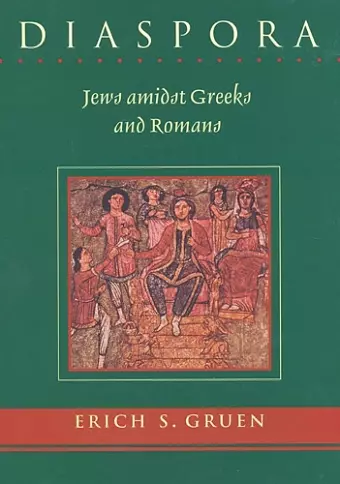Diaspora
Jews amidst Greeks and Romans
Format:Paperback
Publisher:Harvard University Press
Published:24th Nov '04
Currently unavailable, and unfortunately no date known when it will be back

In Diaspora, Erich Gruen explores the Jewish experience in the Mediterranean during Classical antiquity, revealing a thriving community engaged with Greco-Roman culture.
What was life like for Jews settled throughout the Mediterranean world of Classical antiquity—and what role did Jewish communities play in Greco-Roman civilization? Diaspora examines the Jewish experience from the time of Alexander the Great's conquest of the Near East to the Roman destruction of the Jewish Temple, revealing some unexpected insights.
By the first century of our era, Jews living outside of Palestine greatly outnumbered those within it. Significant Jewish populations were established across the Greek mainland, Aegean islands, Asia Minor, the Tigris-Euphrates valley, Egypt, and Italy. In Diaspora, Erich Gruen focuses on key locations such as Alexandria, various Greek cities in Asia Minor, and Rome, exploring the lives of these Jewish communities. He highlights the challenges they faced, the institutions they built, and their methods of adaptation.
Gruen's work uncovers a nuanced picture of a Jewish minority that thrived within Greco-Roman cities. Despite occasional harassment, these Jews engaged deeply with the surrounding culture, reshaping it while maintaining their identity. They displayed a commitment to both their heritage and their local communities, illustrating a complex relationship with the dominant society. Diaspora offers an innovative analysis that reshapes our understanding of how this vibrant culture interacted with the Classical world, challenging previous views of Jewish defensiveness in cultural matters.
Eloquently, learnedly, persuasively, Gruen invites the reader of his new book to consider familiar evidence from the Jewish past from a new—one might say a non-diaspora—perspective. His point is simple, but its historical implications are profound. As he observes, in the nearly four hundred years that stretch between Alexander the Great…and the emperor Nero…Jews could be found in large numbers, and in well-established communities, throughout the Mediterranean. Neither military compulsion nor the vicissitudes of captivity had brought most of them to those places. To state the point a little differently: the Roman destruction of Jerusalem and its Temple in 70 C.E. did not cause the second diaspora. Many ancient Jews—probably most ancient Jews—had by that point lived outside the land of Israel for centuries. They did so, evidently, because they wanted to do so. -- Paula Fredriksen * New Republic *
[Gruen’s] book reminds us that, remarkably, there was a time in history when there was no anti-Semitism. Its virulent strain only broke out in the terrible race riot in Alexandria of 38 CE, when the Romans were already ruling the city and the Jews and the Egyptians were vying for their favor—and their jobs. Gruen’s fine book is obviously the labor of a lifetime. -- Erich Segal * Times Literary Supplement *
Mr. Gruen, a specialist in the history of the Hellenistic period and author of the magisterial volume The Hellenistic World and the Coming of Rome, explores the complex and often ambiguous place of Jewish communities in the classical world and the ways in which Jewish literary culture grew and flourished in this diaspora. He argues forcefully that Greece and Rome were not the unrelenting oppressors that Jewish tradition makes them out to be. -- Mark Miller * Washington Times *
Gruen’s greatest contribution is that he sees the events…of Jewish history and the literature produced by Hellenistic Jews against the backdrop of events of contemporary non-Jewish history and culture… I have seldom read a book on such a controversial topic that is so full of common sense—and so readable. -- Louis Feldman * American Journal of Philology *
Gruen convincingly demolishes whatever remains of the polarized picture of Jews either faithful to their traditions and longing for Jerusalem or swallowed up in a hostile, alien culture… [A] learned and lively presentation of the evidence as well as the theme. -- Jonathan J. Price * Religious Studies Review *
Rather than seeing Jews as passive or as mere victims of hostile forces, Gruen presents a complex picture of large and dynamic communities unafraid to assert their Jewish identity while interacting with other groups in Rome, Alexandria, and Asia Minor… This is a rich, novel, and accessible approach to the realities of one of history’s most important diasporas. -- B. Weinstein * Choice *
Erich Gruen is a fresh, creative, and arresting voice, whose work is truly paradigm-shifting. The prevailing scholarly paradigm has viewed the Jews as on the defensive, nervous in their cultural engagement with Hellenistic culture. This book powerfully challenges that scholarship: I expect it to be discussed for years to come. Gruen’s expertise shines through on every page. This is a major intellectual achievement. -- John M. G. Barclay, University of Glasgow
- Nominated for Ralph Waldo Emerson Award 2003
- Nominated for James Henry Breasted Prize 2003
- Nominated for National Book Awards 2002
- Nominated for Award for Excellence in the Study of Religion 2003
ISBN: 9780674016064
Dimensions: 235mm x 156mm x 28mm
Weight: 454g
400 pages